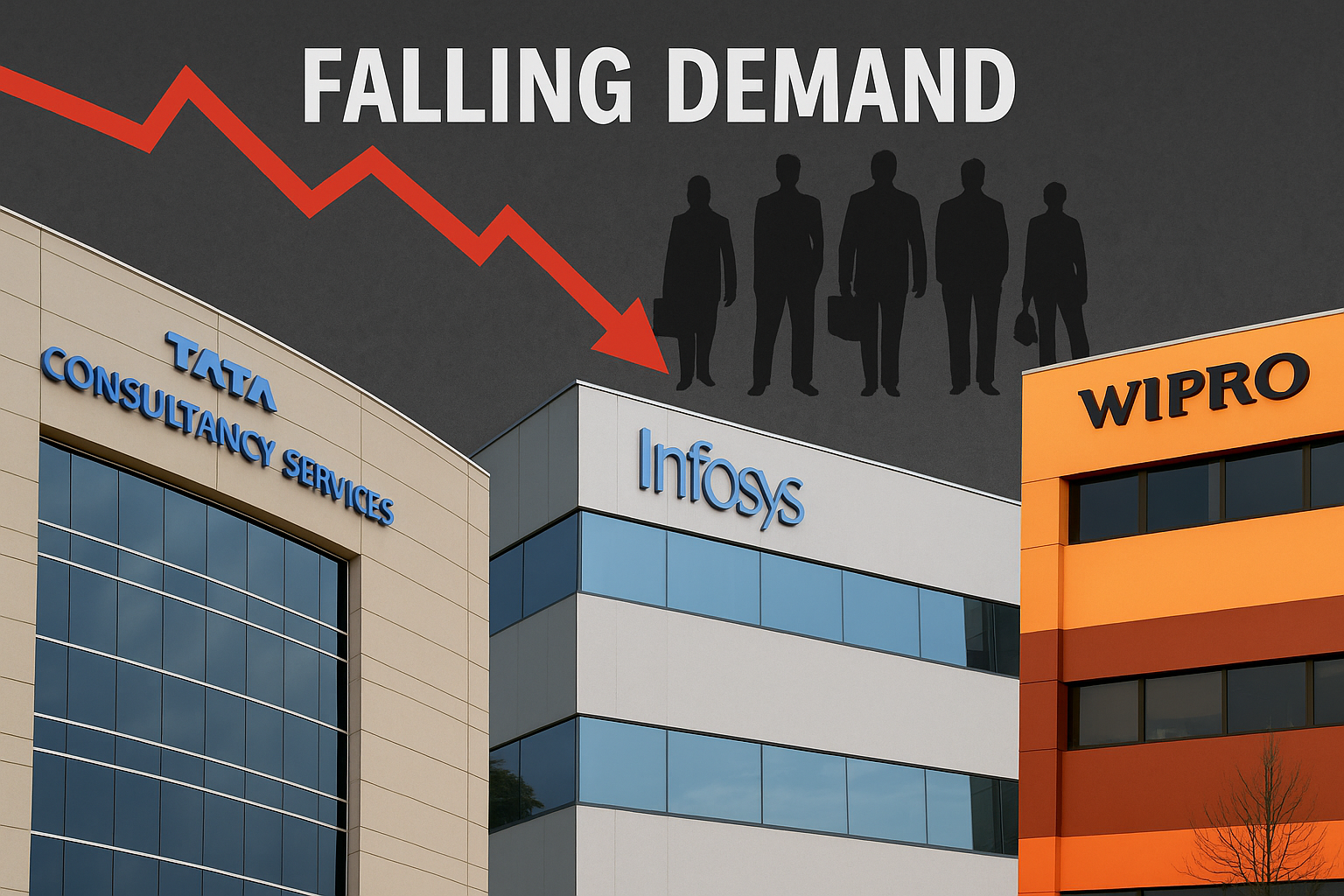
India’s top IT giants — Tata Consultancy Services (TCS), Infosys, and Wipro — have announced their Q4 FY25 financial results, painting a mixed picture of growth, challenges, and cautious optimism amid global macroeconomic uncertainties. Let’s take a detailed look at the performance of these tech heavyweights and the underlying trends shaping the IT landscape.
TCS: Stable Revenue, Slight Dip in Profit
Tata Consultancy Services (TCS), India’s largest software exporter, reported a consolidated net profit of ₹12,224 crore for Q4 FY25 — a slight decline from ₹12,434 crore in the same period last year. Despite this, TCS achieved a steady 5% growth in consolidated revenue, touching ₹65,507 crore compared to ₹62,394 crore a year ago.
The board recommended a final dividend of ₹30 per equity share, maintaining its commitment to shareholder value. TCS added 625 employees in Q4 and has ambitious hiring plans for FY26, projecting the onboarding of 42,000 freshers, the same as FY25 or slightly higher.
Interestingly, TCS is deferring wage hikes for FY26, citing an uncertain business environment. The hikes will be reviewed and implemented depending on how market conditions evolve throughout the year.
Wipro: Strong Profit Growth, Modest Revenue Rise
Wipro delivered the highest percentage growth in net profit among the trio, posting a 25.9% year-on-year increase to ₹3,569.6 crore, up from ₹2,834.6 crore in Q4 FY24. However, revenue growth remained muted, with a slight 1.3% rise to ₹22,504.2 crore from ₹22,208.3 crore.
The company had already declared an interim dividend of ₹6 per share earlier in January 2025. Wipro also added 614 employees during the quarter and plans to onboard between 10,000 to 12,000 freshers from campuses in FY26.
However, Wipro's management offered a cautious outlook, guiding for IT Services revenue to decline sequentially by 1.5% to 3.5% in constant currency terms, highlighting challenges ahead. Wage hikes for Wipro employees will be decided closer to the date, reflecting the company’s wait-and-watch approach.
Infosys: Revenue Up, Profit Down, and Lowest Guidance Since 2009
Infosys reported a 12% drop in net profit to ₹7,033 crore for Q4 FY25, compared to ₹7,998 crore last year. On the positive side, revenue grew 7.9% year-on-year to ₹40,928 crore.
The company’s board declared a final dividend of ₹22 per share for FY25. Infosys added 199 employees in the quarter and aims to hire over 20,000 freshers in FY26, maintaining its focus on building a strong talent pipeline despite macro headwinds.
However, the real dampener came from its revenue guidance for FY26, which was lowered to a range of 0-3% growth — the weakest projection since 2009 — reflecting sluggish global demand and uncertain business sentiment. Infosys did start rolling out wage hikes for most employees from January 2025, with the remaining workforce getting theirs from April 1.
Headcount and Hiring: Signs of Caution
Combined, TCS, Infosys, and Wipro added only 13,553 employees in FY25, underscoring subdued demand and cautious hiring amid global economic headwinds.
In terms of fresher hiring for FY26:
TCS plans to hire ~42,000 or slightly more.
Infosys will onboard over 20,000 freshers.
Wipro aims for 10,000-12,000 campus hires.
This shows that while companies are preparing for future demand, the short-term environment is marred by uncertainty.
In total, 13,553 employees were added by the three firms throughout FY25 — reflecting subdued hiring due to macroeconomic challenges.
Wage Hike Announcements
Infosys: Rolled out wage hikes for the majority of employees starting January 2025, and the remaining staff received increments from April 1, 2025.
TCS: Deferred wage hikes due to the uncertain environment. Chief HR Officer Milind Lakkad stated that hikes will be announced “anytime during the year depending on business conditions.”
Wipro: Yet to decide on wage hikes for FY26. The company will make the decision “closer to the date,” according to CHRO Saurabh Govil.
Expert Take: Industry Facing Headwinds
Piyush Pandey, Lead Analyst-IT at Centrum Broking, highlighted the cautious sentiment, noting,
“We see very weak headcount addition, reflecting current macroeconomic challenges.”
Adding to this perspective, Puneet Singhania, Director at Master Trust Group, highlighted:
“Infosys's Q4 results, along with earnings from other major IT players, continue to indicate softening demand in the Indian IT industry.”
Singhania also flagged a key risk for FY26 — the reciprocal tariffs imposed by U.S. President Donald Trump, which could become the biggest hurdle for Indian IT service exporters.
He emphasized that global uncertainties and macroeconomic headwinds are eroding client confidence, prompting businesses to adopt a wait-and-watch approach on IT spending. Industries that traditionally drive IT growth are now delaying decisions on new projects, adding further pressure to revenue pipelines.
Adding to the caution, global investment banks JPMorgan and Goldman Sachs recently downgraded their outlook on India’s IT sector due to the rising risks associated with potential U.S. tariffs under President Trump’s administration. This signals heightened concern among institutional investors over the sector’s near-term profitability and growth prospects
The Q4 FY25 earnings of TCS, Infosys, and Wipro underline an industry that’s steady, but cautious. While hiring plans and dividends reflect long-term confidence, profit dips, lowered revenue guidance, and deferred wage hikes show that India’s IT sector isn’t immune to global turbulence.
Disclaimer:
This article is for informational purposes only, based on publicly available financial statements and company press releases. It should not be considered investment advice. Always consult a financial advisor before making investment decisions.




